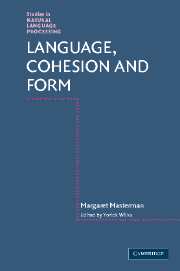Book contents
- Frontmatter
- Contents
- Preface
- Editor's introduction
- Part 1 Basic forms for language structure
- Part 2 The thesaurus as a tool for machine translation
- Part 3 Experiments in machine translation
- Part 4 Phrasings, breath groups and text processing
- Part 5 Metaphor, analogy and the philosophy of science
- 11 Braithwaite and Kuhn: Analogy-Clusters within and without Hypothetico-Deductive Systems in Science
- Bibliography of the scientific works of Margaret Masterman
- Other References
- Index
11 - Braithwaite and Kuhn: Analogy-Clusters within and without Hypothetico-Deductive Systems in Science
Published online by Cambridge University Press: 22 September 2009
- Frontmatter
- Contents
- Preface
- Editor's introduction
- Part 1 Basic forms for language structure
- Part 2 The thesaurus as a tool for machine translation
- Part 3 Experiments in machine translation
- Part 4 Phrasings, breath groups and text processing
- Part 5 Metaphor, analogy and the philosophy of science
- 11 Braithwaite and Kuhn: Analogy-Clusters within and without Hypothetico-Deductive Systems in Science
- Bibliography of the scientific works of Margaret Masterman
- Other References
- Index
Summary
1. Current relativist conceptions of science depend widely, though vaguely, upon the insights of T. S. Kuhn (1962), and, in particular, upon his notion of a paradigm. This notion is being used by relativists to support the contention that, since scientific theory is paradigm-founded, and therefore context-based, there can be no one discernible process of scientific verification. However, as I have shown in an earlier paper (1970a), there is another, more exact conception of a Kuhnian paradigm to be considered: namely, that conception of it which says that it is either an analogically used artefact, or even sometimes an actual ‘crude analogy’, that is, an analogical figure of speech expressed in a string of words.
This alternative conception of paradigm, far from supporting a verification-deprived conception of science (which, for those of us philosophers who are also trying to do technological science, just seems a conception of science totally divorced from scientific reality) can, on the contrary, be used to enrich and amplify the most strictly verification-based philosophy of science that is known, namely the Braithwaitean conception of it as a verifiable hypothetico-deductive (H-D) system. For such a paradigm, even though, in unselfconscious scientific thinking, it is usually a crude and concrete conceptual structure, can yet be shown to yield a set of abstract attributes.
- Type
- Chapter
- Information
- Language, Cohesion and Form , pp. 283 - 298Publisher: Cambridge University PressPrint publication year: 2005

